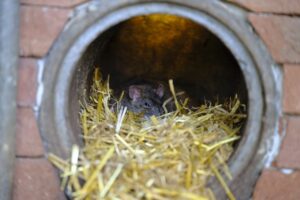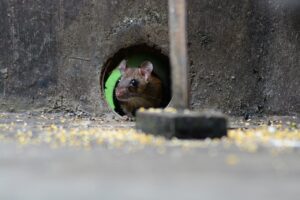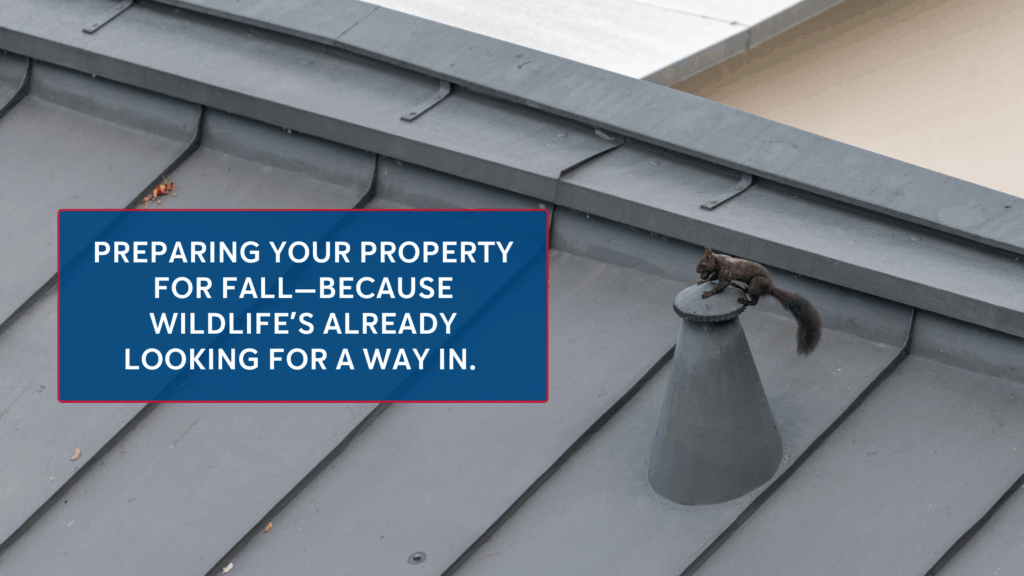No, most rodents will not leave an attic on their own. Which is why the pitter patter of a rat running across the attic floor while you lay in bed is such a dreaded sound. When you hear it, you probably frantically search for a good wildlife removal option. Critter removal from your attic isn’t something that most people think about until they need it, but once you do, you need it fast.
In this blog we’ll look at:
- The different types of rodents that are common in attics
- How and why they use an attic space
- If they can get into the house once they’ve moved into the attic
- If they pose a threat when they live in an attic space
What Rodents Commonly Enter an Attic?
Three kinds of rodents are most commonly found in attics—squirrels, rats, and mice. These animals are all drawn to attics looking for dark, quiet, protected areas to nest and breed. Each of these types has their own clues that can help you figure out which animal you’re dealing with.
- Squirrels are the most common animal found in attics. They are active during the day and quiet at night. They can be heard scratching, squeaking, and dropping off food that can roll across the floor or down walls. Their nests are made of twigs, leaves, and paper. While their droppings look like large brown grains of rice.
- Rats are active at night. Signs of rats in the attic include hearing them quickly moving often up and down walls and chewing and scratching. They leave large amounts of droppings smaller than squirrels but larger than mice. They are very destructive, leaving tunnels through insulation and chewing on wires, wood, and pipes.
- Mice are also active at night and are similar to rats in many ways. They are smaller and typically less destructive. You may hear them moving more quietly and chewing less aggressively.
Will Rats Leave an Attic on their Own? What About Mice and Squirrels?
None of the rodents that commonly get into home attics will leave on their own. They moved into the attic in the first place because it offers good protection from the elements and a safe place to nest. Although individual animals will leave periodically to search for food, they nearly always will return to the safety of the attic.
In many cases, several rodents will move into an attic space as a group or reproduce in an attic nest. When there are multiple animals, it is unlikely that all of them will leave simultaneously. In these situations, there will always be at least one rodent present.
It is important to remember this when you are thinking about blocking off the holes that allowed rodents access to the attic to begin with. You want to make sure that you do not trap animals already in the attic by closing off their exit. You need to have a plan to remove the animals already there before sealing the space. This is where exclusion work is the preferred tactic by our experts who deploy one-way traps in situations like the one we’ve described.

Do Rats Leave the Attic During the Day?
Rats and mice are nocturnal creatures, so if they nest in an attic, they usually stay and sleep there during the day. However, squirrels are active during the day and usually leave an attic nest to gather food.
Can Rats in an Attic Get into a House?
Yes, rodents in an attic can get into a house. In general, this is much more common for rats and mice than for squirrels. Once rats and mice become comfortable in an attic space, they will generally start exploring more and making it into other parts of the home. Rats tend to be a bit more clever in their sleuthing, but they’re usually more willing to go farther distances than mice to explore. While mice often stay within a tighter radius, they are not quite as clever as rats are.
Are Rats in the Attic Dangerous?
Any unwanted pest animal in a home can be dangerous, and rodents in the attic are no different. Rodent droppings can spread disease or be harmful to human lungs. Fleas or other parasites that travel in on the rodents can infest a home and the humans or pets living there. These animals can chew and dig through wires, pipes, and other important home parts and create fire risks, water damage, or structural concerns. Waiting on animals to leave your attic isn't a good idea; they can still cause problems even if they're confined to that space. Once you become aware that you have unwanted critters, it’s time to start searching for an animal in attic removal near me.
How to Get Rid of Rodents in the Attic and Walls?
Although there are a variety of traps and chemical deterrents available for dealing with rodents in your home, getting in a professional is often a better solution. This is especially true in cases where there is a large infestation or where you are concerned about health risks to your family.
Our team at Turner Pest Control has been helping homes and businesses safely deal with pests for over 50 years. We’re a dedicated team proud to have served more than 84,000 customers across Florida with SMART Pest Control and wildlife control.




